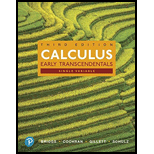
Concept explainers
Perpetual annuity Imagine that today you deposit $B in a savings account that earns interest at a rate of p% per year compounded continuously (Section 6.9). The goal is to draw an income of $I per year from the account forever. The amount of money that must be deposited is
Want to see the full answer?
Check out a sample textbook solution
Chapter 8 Solutions
Single Variable Calculus: Early Transcendentals, Books a la Carte, and MyLab Math with Pearson eText -- Title-Specific Access Card Package (3rd Edition)
- EXAMPLE 3 Find S X √√2-2x2 dx. SOLUTION Let u = 2 - 2x². Then du = Χ dx = 2- 2x² = 信 du dx, so x dx = du and u-1/2 du (2√u) + C + C (in terms of x).arrow_forwardLet g(z) = z-i z+i' (a) Evaluate g(i) and g(1). (b) Evaluate the limits lim g(z), and lim g(z). 2-12 (c) Find the image of the real axis under g. (d) Find the image of the upper half plane {z: Iz > 0} under the function g.arrow_forwardk (i) Evaluate k=7 k=0 [Hint: geometric series + De Moivre] (ii) Find an upper bound for the expression 1 +2x+2 where z lies on the circle || z|| = R with R > 10. [Hint: Use Cauchy-Schwarz]arrow_forward
- Hint: You may use the following derivative rules: ddxsin(x)=cos(x) ddxcos(x)=−sin(x) ddxln(x)=1x Find the equation of the tangent line to the curve y=4sinx at the point (π6,2).The equation of this tangent line isarrow_forwardQuestion Find the following limit. Select the correct answer below: 1 2 0 4 5x lim sin (2x)+tan 2 x→arrow_forward12. [0/1 Points] DETAILS MY NOTES SESSCALCET2 5.5.022. Evaluate the indefinite integral. (Use C for the constant of integration.) sin(In 33x) dxarrow_forward
- 2. [-/1 Points] DETAILS MY NOTES SESSCALCET2 5.5.003.MI. Evaluate the integral by making the given substitution. (Use C for the constant of integration.) x³ + 3 dx, u = x² + 3 Need Help? Read It Watch It Master It SUBMIT ANSWER 3. [-/1 Points] DETAILS MY NOTES SESSCALCET2 5.5.006.MI. Evaluate the integral by making the given substitution. (Use C for the constant of integration.) | +8 sec² (1/x³) dx, u = 1/x7 Need Help? Read It Master It SUBMIT ANSWER 4. [-/1 Points] DETAILS MY NOTES SESSCALCET2 5.5.007.MI. Evaluate the indefinite integral. (Use C for the constant of integration.) √x27 sin(x28) dxarrow_forward53,85÷1,5=arrow_forward3. In the space below, describe in what ways the function f(x) = -2√x - 3 has been transformed from the basic function √x. The graph f(x) on the coordinate plane at right. (4 points) -4 -&- -3 -- -2 4 3- 2 1- 1 0 1 2 -N -1- -2- -3- -4- 3 ++ 4arrow_forward
- Algebra & Trigonometry with Analytic GeometryAlgebraISBN:9781133382119Author:SwokowskiPublisher:Cengage



 College AlgebraAlgebraISBN:9781305115545Author:James Stewart, Lothar Redlin, Saleem WatsonPublisher:Cengage Learning
College AlgebraAlgebraISBN:9781305115545Author:James Stewart, Lothar Redlin, Saleem WatsonPublisher:Cengage Learning Algebra and Trigonometry (MindTap Course List)AlgebraISBN:9781305071742Author:James Stewart, Lothar Redlin, Saleem WatsonPublisher:Cengage Learning
Algebra and Trigonometry (MindTap Course List)AlgebraISBN:9781305071742Author:James Stewart, Lothar Redlin, Saleem WatsonPublisher:Cengage Learning





